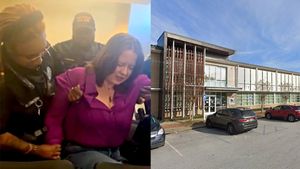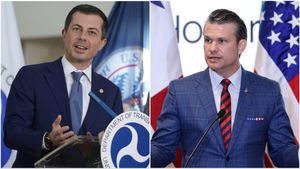“Not everyone can believe this. Surely, they can see what he is,” says Kate Winslet’s Lee Miller in response to a newsreel of Adolf Hitler in the 1930s. The scene occurs early in the film. Miller and her soon-to-be partner, the English artist Roland Penrose (Alexander Skarsgård), and her bohemian friends including fashion editor Solange d’Ayen (Marion Cotillard) and the artist and model Nusch Éluard (Noémie Merlant) are languishing at an estate in the French countryside when Miller makes the prescient statement. An American fashion model and photographer, Miller pushed to chronicle the atrocities of World War II. She famously posed for a photograph in Hitler’s bathtub after Nazi Germany’s fall. The film from renowned cinematographer and first-time director Ellen Kuras captures about 10 years of Miller's life, highlighting her spirit and her refusal to allow gender or the sexual abuse she endured as a young person to be a barrier to her critical work.
Keep up with the latest in LGBTQ+ news and politics. Sign up for The Advocate's email newsletter.
“Lee was utterly unique. She was born with her eyes wide open, and she lived life at full throttle. But the most important, and for me, the most treasured thing about Lee was that she treated everybody the same, and she didn't judge anyone for who they were, where they had come from, what their life journey had been,” Winslet tells The Advocate. “It is a very beautiful superpower in a way. Certainly then, certainly then at a time that was full of prejudice and full of sexual discrimination.”
 Andrea Riseborough and Kate Winslet as Lee Kimberly French / Sky U.K. Ltd.
Andrea Riseborough and Kate Winslet as Lee Kimberly French / Sky U.K. Ltd.
Though Miller is initially shut out of male spaces, even passing as a man in one scene to gain access, she finds an ally in British Vogue Editor Audrey Withers (Andrea Riseborough), who publishes Miller's work.
“Audrey Withers was a really unlikely editor of British Vogue during the Second World War in the sense that she was very practical and utilitarian and can-do, but as I say that, I suppose that really makes [her] the perfect candidate during a war because she rallied toward the war effort in every way,” Riseborough says.
“One of the things that she really wanted to do was to give women a voice in all of this. … When she saw Lee's potential, she just in every way wanted to shine a light on her incredible talent, not only as a photojournalist but also as a writer. She wrote beautifully and was a brilliant war correspondent and really, really fought to try and help Lee get as close to the frontline as she could," she adds.
 Andy Samberg and Kate Winslet in Lee Kimberly French / Sky U.K. Ltd.
Andy Samberg and Kate Winslet in Lee Kimberly French / Sky U.K. Ltd.
As depicted in Lee, once Miller makes her way to the frontlines, she covers major events including the liberation of Paris and the horrors at the Buchenwald and Dachau concentration camps. Life photographer David Scherman (Andy Samberg) was with her for much of it. The film highlights the photographers’ lifesaving friendship amid the war and its aftermath.
“They experienced things together in the name of their work that most people would not ever go through. I think it became an important relationship for both of them, obviously,” Samberg says. “They had this mission and they were seeing it through together, but they also had a lot of admiration and respect for one another.”
Just as Withers championed Miller, Winslet says Miller made space for other women.
“She lived her life, seeing people, seeing circumstances, seeing situations, making sure that people were heard. And she was a phenomenal friend,” Winslet says. “She was always taking younger women under her wing, especially if they lacked in confidence."
Watch the full interviews with Winslet, Riseborough, and Samberg above. Lee is in theaters now.




 Andrea Riseborough and Kate Winslet as Lee Kimberly French / Sky U.K. Ltd.
Andrea Riseborough and Kate Winslet as Lee Kimberly French / Sky U.K. Ltd.  Andy Samberg and Kate Winslet in Lee Kimberly French / Sky U.K. Ltd.
Andy Samberg and Kate Winslet in Lee Kimberly French / Sky U.K. Ltd. 
















































































